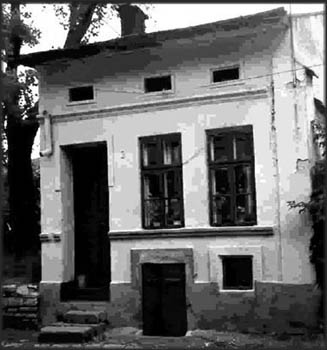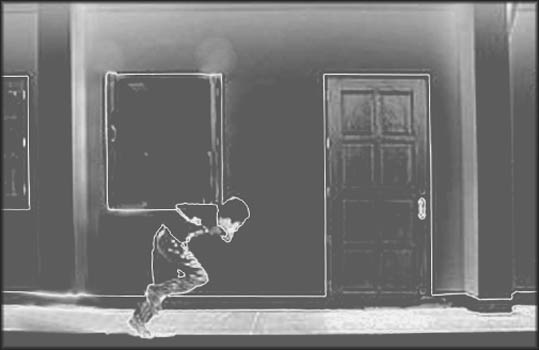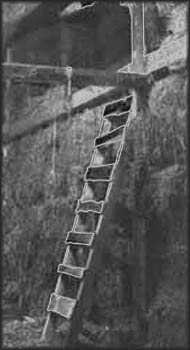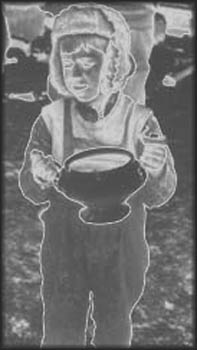Click on photo to enlarge

|
I went to the second farm with my brother Hersh and some other Jews who worked with us. When we got there, soldiers were guarding the courtyard on both sides of the fence. One of them was standing inside the gate and he would not let us go into the courtyard. All of the Jewish workers from the two farms were gathered in that courtyard. I don't know what their fate was. I later was told that they had been taken to Czortkow or to a work camp in Lvov. These were just rumors and I do not know if they were true.
We were instinctively cautious. We never expected that the Germans would be so good that they would protect us until the end of the war.
My brother Hersh said to me: "Climb up, together with this family." He was referring to the Jew who worked with him, the one who lived outside of the city. This man's name was Yagendorf. He was there together with his wife and his daughter, who already were hiding in the loft, so he and I joined them. Hersh said to me: "You climb into the attic and afterwards I will take the ladder to the side." He also gave me a gold chain and said, "Whatever happens, happens. It is possible that we won't meet again. I am going to try to run away by climbing over the wall." However, others who had tried to climb the wall had been caught by the Germans who were guarding the wall. Hersh said, "I will try to run away or to hide some place else. You go up into the loft with them."
I don't know if my brother went into the bunker or not, but the bunker was discovered and the people were taken out and deported. I think some of the workers at the second farm kept their families in that bunker.
So I went up into the loft with the Yagendorfs, who already had been hiding there. We lay there above the horse stable. We were able to hear them gathering everyone together and bringing them outside. Towards evening, everything calmed down and was quiet. At night, when it was totally quiet, we began to come down slowly from the attic. We crept out the back door, crept outside, and then we ran. There was another girl there. I don't remember her name, but she also was hiding with us.
I was just a kid and I didn't know what to do. I didn't know if they had taken my brother or if he had been able to run away. My intention was to go to the same place where we always met, to the orchard, in hopes that I would be able to find my brother there.
Yagendorf, his wife and his daughter ran some place else and I didn't see them again until the end of the war. The entire family was saved. I think they were kept alive by Ukrainians. I do not know if this was in Skala or in another city.
When I got there, I met my father and Aron. While they had been hiding in that empty house behind where the Germans lived, they had seen what was happening and had decided that when it was dark, they would return to the orchard. My brother Hersh was not there. Apparently he had been deported, but we didn't know to where. We really did not have any connection with the outside world. We were not able to go to the Ukrainians and ask and we had no connection with anyone else.
We hid at the house of a Ukrainian whom my father either had given a little money or had promised to give money. My father also gave him my sister's leather coat and he hid us. I do not remember his name. We hid in his hayloft. We slept on the hay and stayed in his fields, not in his house. The Ukrainians were terribly afraid because they had been told that if they hid Jews, their farms would be set afire. For whatever reason, this Ukrainian agreed to hide us and, occasionally, he would bring us food.
One evening I went to the pharmacy with the gold chain that my brother Hersh had given me. The pharmacy was outside of the city and I had to go a roundabout way so that I would not be seen. I went to the pharmacy in order to sell the chain. This pharmacist was a property owner and he was interested in buying things. I was not able to simply go to any goy and offer him the chain. I went to the pharmacist because I was confident that he would not inform on me; but, of course, I did not tell him that I was with my father and brother or where we were hiding and I left the pharmacy by a different route, not in the direction that led to where we were hiding. I sold him the chain. He weighed it and gave me whatever he gave me, I don't remember what. With that money, we could buy bread for some time thereafter.
I went to a different Ukrainian family, not the one where we were staying, to buy bread. In Skala, everyone baked bread for himself. I asked them to bake me eight or ten loaves of bread and I would come with a bag, take the loaves and pay for them. They didn't inform on me. Of course, I always was careful and they were careful that I not be seen. It was bread with onions or dry bread with salt. Sometimes, infrequently, this goy would give us some soup.
When the policeman came, we had been lying down and I had taken off my clothes, which already were in tatters. I'd had no time to dress and now I was almost naked. I had only a shawl around me that we had bought from the same goyim from whom we bought our bread. I ran barefoot and the snow was up to my knees.
 | We ran to another farm, some three or four houses down from where we had been hiding. It was a place where my parents once had lived and the Ukrainians who lived there knew my family well. Many times we had hidden in their fields. We ran there and went inside to the cow stables. |
In the cow shed my brother Aron and I climbed into the loft. My father ran across the road to another place. I do not know why he did this -- perhaps because he wanted to lift us up into the loft and then take the ladder away, so that the policeman would not know that we were hiding there. The policeman didn't find us and, eventually, he went away.
After the policeman left, the grandson of the Ukrainian woman who lived there discovered us. The husband of this woman had died and she already was old. Her grandson said to us, "Get out of here. I don't want any problems." We were very afraid of him. His father had been one of the fanatical Ukrainians and he was known as a nationalist. They killed his father or his brother, who had been full of hate. I said to him: "Look, I cannot go out like this." He brought me pants and rags for my legs. We didn't have a choice, so we ran back to the same place we had been, as he watched the direction in which we went.
 | We waited for my father to come back to that place, but he did not return. In the meantime, the Ukrainian grandson, who had watched the direction in which we had run, went towards the city. A while later, a policeman came to search for us, so apparently the Ukrainian had informed on us. We didn't want to stay in the same place, so we climbed higher in the loft. It was a sort of granary. On either there was straw and it was open in the middle. It was necessary to climb up a ladder that was off to the side and not in the same place that we had climbed up. We removed a bundle of hay and lay down there. The policeman climbed up the other side and I was sure he would see us; but we lay there without making any movement, so he didn't see us and he went away. |
Just after the policeman left the granary, we suddenly heard shots. At that exact moment, my father -- not knowing that there was a policeman around -- had tried to return to the granary. When we had been in the cow shed, my father had run to another house across the road; but that family hadn't wanted to keep him and had said, "Go! Get out of here!" My father had pleaded, "Let me wait until it gets dark and then I will go." But they had insisted that he leave immediately. It was almost evening and already a little dark. He had been trying to cross the road when the policeman saw him. The policeman had fired into the air and hadn't killed him. My father had tried to run away, but the policeman had caught him and and taken him to the police station.
My brother and I decided to stay in the granary. That night, I heard someone shouting "Aron, Aron," with a Yiddish accent. I thought it was my father and we got up to answer. In fact, it was the Ukrainian who lived there. He knew how to speak Yiddish well and he said to us: "Look, I don't want to know anything. Go from here! I don't want problems with the police! You have to leave here!" We said to him: "OK, we will go." This was in the evening. It was dark and we didn't know what to do. We decided to go closer to the city and to climb into the attic of an abandoned house and to stay there.
Before we left, we asked the Ukrainian about our father and he told us that the police had taken him. At the end of the war, a Jewish survivor who had been in the same jail with my father told us that the Ukrainian police had taken the two of them to the Jewish cemetery in order to kill them. Although they had shot at this man, he had managed to escape. My father Avraham was killed there, in Skala's Jewish cemetery.
This was during the period when the Germans were retreating from the Russians, in the winter of 1944. We lived in the attic and ate snow. Both of us were bloated from hunger and cold. We didn't have shoes and only had rags on our legs.
Things were not normal at that time. There no longer was a market day. There already was a German retreat and we saw the Hungarian army passing by there in retreat. They had different uniforms that were sort of green. They stationed themselves in the market and there they cooked food.
One day, Hungarian soldiers came to the house in which we were hiding, in order to take the doors and the windows and use them for kindling. We were afraid that they would find us and that we would not be able to escape, so we ran away as they were approaching the house and they ran after us. I ran into another abandoned house and climbed up the destroyed walls to the attic, because there were no stairs.
My brother Aron continued running and entered the yard of a Ukrainian whom we knew and whose sons I knew. The Hungarian soldiers ran after Aron and caught him. I do not know exactly what happened to him. There were those who later said he was turned over to the Ukrainian police. Others said the Hungarians took him with them and still others told me that he was stabbed with a knife right in the middle of the street.
I remained in the attic. That night, a Ukrainian or Polish boy climbed up to the attic in order to take some wood home and he saw me. We had been friends and had gone to school together. I knew his name and when I saw him come up into the attic, I said to him: "Be quiet and don't tell anyone! Promise me that you won't tell anyone at home." I was afraid because he had a brother who was a murderer. I think his brother had helped to capture my brother Aron. I said to him: "Don't tell anyone. I am leaving here." He swore that he would say nothing, but I assumed that he would go home and immediately tell people about me. So the moment he left the attic, I went down after him and ran away.
 | I began to wander from farm to farm of Ukrainians whom I knew and who knew me. When my father had been an egg dealer, he had collected eggs from them, so everyone knew our family. Also, I had gone to school with a lot of their children. This was during the time that the Germans were retreating. I walked around and I stole food. I took fresh eggs from the chicken coops and drank them. I also went to the houses, where I was received in a very different way. The people no longer were frightened. They no longer said to me, "You are not a Ukrainian. They will capture you." |
In one place they made me a meal. I was very hungry, but because they had made me such a heavy meal that I wasn't able to eat anything. I had one or two spoonfuls, but could eat no more. They said to me, "After you eat, go from here, don't stay here." I promised them I would go. That night I went into their hayloft. I was there all night and left in the morning so that they would not even know I had been there -- although the next day, they told me that they had known I was there. I was very afraid. Despite the German retreat, we often would hear gunshots. And the Germans who were retreating wandered around the farms taking straw for their military posts, food, turkeys, etc.
Once I was stopped by the Germans and they asked the Ukrainians, "Who is this?" The Ukrainians replied, "A Jew." They brought me to those Germans in the city for whom we once had worked, to a place to which I never had been before -- a house where the higher-ranking German officers lived. A certain goy who worked there as a cook looked at me and said, "Oh, are you still alive?" He had come forward because I had told the German officers that I once had worked for the Germans. The cook spoke Polish fairly well because he was from Silesia. He said, "OK, leave him here." Afterwards he said to me, "Go, run away from here!" He allowed me to escape and I left.
I didn't have any place else to hide. Sometimes I entered a Ukrainian house and once they gave me a little vodka to drink, saying, "Warm up a little bit. This will help." I had an intestinal ailment, so I told them that I could not eat. The people now acted very differently towards me. I no longer was afraid that they would inform on me.
In a field, I met some children with whom I once had studied and they invited me to come inside. I still was afraid because Germans were crawling around everywhere. I could not go into the houses of those goyim because Germans frequently would come to the houses to sleep or eat. They immediately would know that I wasn't one of the goyim. I was dressed in rags, my hair was uncut, and I was swollen from lack of food. Those Germans always asked, "Who is this?" But they no longer did anything to me, so I was not afraid of them. Now I was more afraid of the Ukrainians.
I wandered around like that until the Russians came. I don't even remember when that was. The snow had melted and winter had passed. The Russians arrived and, slowly, Jews started coming back and gathering together in Skala. In total, there remained only about 80 Jewish people. I met the Yegendorf family and stayed with them. During this time, we benefited from Russian rule, but we didn't stay in Skala for long because we now were allowed to travel within Poland. The Jews left Skala because they were afraid of the Ukrainians -- frightened that they would kill us so that there would be no witnesses to what they had done to us. I went with the Yegendorfs to Bytom in Silesia.
In Bytom I stayed with the Yegendorfs for a short time. The Jews began to organize themselves. There were emissaries from Israel, from HaShomer HaTzair and other [Zionist] movements. One day someone turned to me and said: "Is that you Bretschneider? Since you are an orphan, an Aliyat HaNoar (Youth Immigration) of orphans is being organized now, to go to Eretz Yisrael." He told me I should sign up for this Aliyat HaNoar. I decided that I would join this group of children and I would travel to Palestine.
|
The testimony of Menachem Bartel was taken in September, 1965, when he was interviewed in Tel Aviv by Miriam Tov.